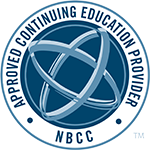Recorded Webinar
Instructor: Katherine Glick, LPC, LCADC, ACS, MAC, SAP
CEs/Contact Hours: 1.5
Level: Intermediate
Target Audience: Social workers and other social service providers.
Course Delivery Method and Format: Recorded webinar, self study. All courses are hosted on SmithOnline. Login information will be emailed immediately after registration to the email address entered during registration.
System Requirements: Attendees will need access to a computer with internet and the capability to play recorded videos.
Date of original webinar: April 29, 2020
This course will assist participants in understanding variations in non-monogamous and polyamorous relationship structures, in order to enhance their therapeutic skills when working with individuals and relationships that are not traditionally monogamous. Participants will be guided to deconstruct their existing views on non-monogamy before learning about the various options for non-monogamous and polyamorous relationship structures. The differences between ethical non-monogamy and non-ethical cheating/infidelity will be discussed and understood within the context of working with individuals navigating relationships. Participants will learn about common challenges of non-monogamy and polyamory, and will enhance the therapeutic skills necessary to work effectively with non-monogamous and poly individuals/relationships.
Registration Fee and Deadline:
$35 (one time registration fee of $5) | Ongoing
Learning Objectives:
- Identify 3-5 types of non-monogamous relationship structures.
- Describe how to help clients differentiate between ethical non monogamy and cheating/infidelity.
- Differentiate between hierarchical and nonhierarchical types of polyamorous relationships.
- Explain two major challenges clients encounter when navigating non-monogamy.
- Describe how to help non-monogamous/polyamorous individuals navigate common pitfalls.
Instructor Biography:
Katherine Glick, LPC, LCADC, ACS, MAC, SAP is the founder of Personal Evolution LLC, a holistic and integrative psychotherapy and education practice. Her professional background includes 11 years of clinical experience working in mental health and addiction treatment and psychiatric rehabilitation. She also has held an instructor position in higher education for the past 9 years, teaching psychology, addictions, social work, and counseling courses at the undergraduate, graduate, and continuing education level. In addition, she has provided training seminars and continuing education courses for mental health and addictions professionals since 2013. She also provides consulting, training, programming, and quality assurance services for behavioral health agencies through her LLC.
To receive a CE certificate, you must complete the entirety of the recorded webinar or recorded video presentation. Partial credit will not be awarded to those who attend only a portion of the class. For recorded webinars and online courses, participants must complete an evaluation and a post test, noting the length of time to complete the course. Participants must earn a minimum score of 80 percent on the post test in order to earn CEs. Retesting is allowed up to five (5) times. If a passing score is not achieved, CEs will not be awarded. Links to the evaluation and post test are available in SmithOnline. Participants must also complete an attestation of completion for each fully completed course. A copy of the attestation is available in SmithOnline. It is attendee’s responsibility to contact their state licensing board/certification boards to determine eligibility to meet continuing education requirements.
Upon completing the course evaluation, successfully passing the post test and submitting the attestation, participants will be emailed their online certificate within 30 days of course completion. Participants should save and/or print the certificate upon receipt for their records. Receiving the CE certificate is contingent on submitting attestion, completion of the evaluation and passing the post test.
Continuing Education Credits and Approvals for This Course
Continuing Education (CE) credits offered vary by course. This course only offers the CE credits listed below. It is the attendees' responsibility to contact their licensing board to determine eligibility to meet continuing education requirements.
ACE
Smith College School for Social Work, #1755, is approved as an ACE provider to offer social work continuing education by the Association of Social Work Boards (ASWB) Approved Continuing Education (ACE) program. Regulatory boards are the final authority on courses accepted for continuing education credit. ACE provider approval period:11/19/2024-11/19/2027. Social workers completing this course receive 1.5 clinical continuing education credits.
CSWE
Smith College School for Social Work is accredited by the Council on Social Work Education and is therefore authorized to provide CEs as a postsecondary institution accredited by CSWE in many states. Courses offered through the School’s Program of Professional Education are awarded continuing education credits in accordance with Continuing Education Regulation 258, CMR, 31.00 in the Commonwealth of Massachusetts.
NY State
Smith College School for Social Work is recognized by the New York State Education Department's State Board for Social Work as an approved provider of continuing education for licensed social workers #SW-0169.
Approved for Counselors (LMHC/LPC)

Smith College School for Social Work has been approved by NBCC as an Approved Continuing Education Provider, ACEP No. 7110. Programs that do not qualify for NBCC credit are clearly identified. Smith College School for Social Work is solely responsible for all aspects of the programs. This program offers 1.5 contact hours.
